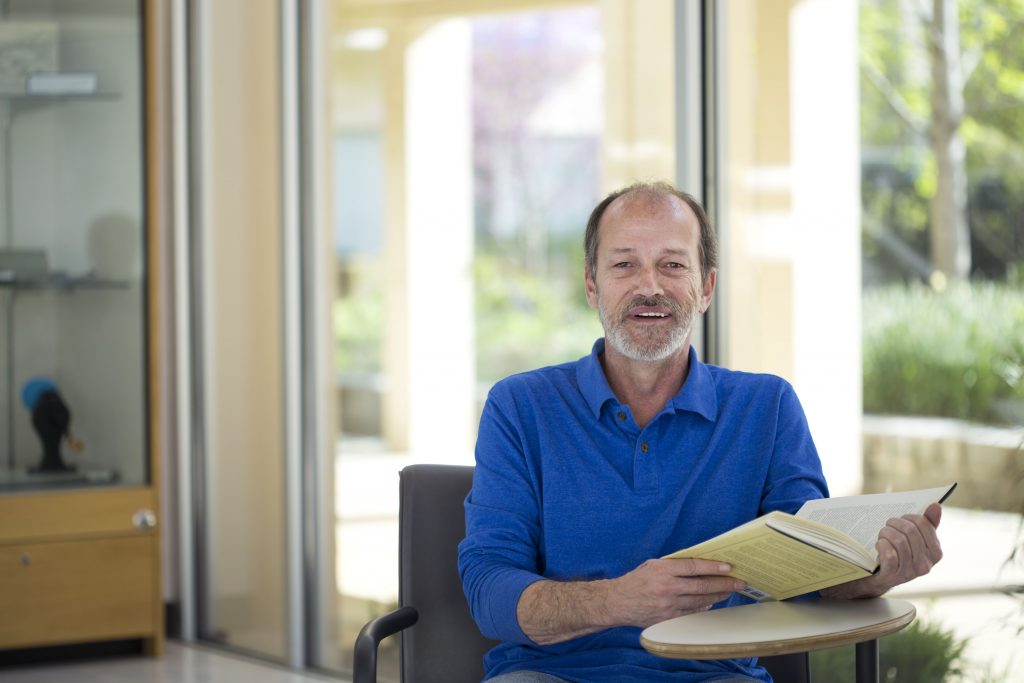
By Bryan Lindenberger
The University of West Georgia offers such limitless possibilities for adult learners that a student could write a book on the subject.
And that’s exactly what Richard Foster, adult learner and graduate student of history, intends to do.
The reflection required to write a book is nothing new to Foster. A single parent raising two sons and a daughter, he worked in construction as a project manager in Atlanta. Commuting from Bremen, Ga., provided him ample time to consider and plan the commercial developments he oversaw.
With more than 30 years in construction, it’s no surprise Foster’s self-identity was tied closely to his career. When the recession hit in 2008, pockets of the construction industry fell upon difficult times. It personally and adversely affected Foster when, on Dec. 8, 2008, he became a part of many talented individuals in his field who were caught in reduced staff situations.
“When you lose your job, you tend to lose your self-worth,” Foster said. “I proudly raised three children, and suddenly I’m concerned with where my next paycheck will be coming from.”
Foster experienced denial, anger, anxiety and boredom – the typical stages experienced by persons confronted with sudden life changes. When his youngest son, a recent college graduate, suggested he take some computer classes at the local technical college, Foster did not have any grand scheme in mind. He enrolled, admittedly, to relieve uncertainty in his future and some associated depression.
Foster did not imagine how this single step would dramatically and positively change his life.
“In May 2012, I was awarded two associate of applied science degrees, one in computer networking and one in computer support, with all honors, from West Georgia Technical College,” Foster said.
In fall 2013, after taking the core classes to be eligible to transfer, he enrolled at the University of West Georgia. Not in computer science, though, but in the College of Arts and Humanities.
“History is a passion,” said Foster, embracing his change of perspective to the fullest. He realized that he’d seen himself as a teacher for much of his life, whether in raising his children or in educating and training his construction team.
History had always intrigued Foster.
“I realized when attending WGTC that the acquisition of relevant computer skills would be valuable for my next journey at UWG,” he said.
Dr. Michael de Nie, professor of history at UWG, said Foster was an engaged and consistently helpful member of his World War II class.
“In many ways, Richard was a model student, inspiring others in the class by example and through his readiness to serve others,” de Nie said.
In December 2016, Richard Foster received his bachelor’s degree in history, graduating summa cum laude.
And he was just getting started.
Foster knew by now he wanted to teach. His undergraduate experience included teaching physics and astronomy labs, which he loved. His UWG professors recognized his leadership skills and ability to mentor and grow others through educational and life experience tools he had gained.
“Richard Foster is an excellent student who deeply cares about history, and he works hard to improve and excel,” said Dr. Steve Goodson, chair of the history department. “He is a natural leader. In every class under my purview, he organized study sessions with other students and looked out for their welfare. He genuinely likes and cares about people.”
Dr. Keith Pacholl agrees, noting his skills are sought in effective educators.
“Richard is very collegial and students tend to gravitate to his leadership, but he does so in a humble and unassuming manner,” Pacholl said.
To teach at a college level, Foster knew he needed to move forward with his master’s degree. When asked why he again chose UWG, the answer, for Foster, is simple.
“The professors.”
Unlike universities where some faculty members may be too entrenched in their own research to follow up with students, and instead rely heavily on teaching assistants, UWG has built a reputation of faculty members taking active involvement in their students’ progress.
Today, Foster works in special collections at UWG’s Ingram Library while keeping up with his studies and working on his master’s thesis.
One might expect all of this would keep him busy enough, as an anticipated graduation date of December 2018 looms. But there’s still that other project.
His book.
Over the past eight years of attending school, Foster has kept a journal. It details his college experience, particularly the issues of returning to class as an adult learner. A couple of years ago, he chose to take on the challenge of turning this journal into a book-length manuscript.
“I decided to put all these stories together and write a ‘how-to’ on navigating the college system as a middle-aged individual,” Foster said.
He said the greatest challenge for an adult learner is simply fitting in.
Foster is weaving journal entries into a narrative which will undoubtedly reflect his leadership, dedication and crisp sense of humor. Ultimately, he sees the greatest challenge in returning to college is in realizing one’s own value in having something to offer.
“Age is not that big of a factor,” Foster said. “In order to be successful, you need to feel comfortable.”
###
UWG serves more than 13,500 students from across Georgia, 37 other states and 72 countries. Perennially ranked by U.S. News and World Report as a top national university, West Georgia offers 88 fields of study, including business, nursing, education, STEM, social sciences and the arts. It generates a regional economic impact of nearly $520 million and provides a safe, quality and affordable college experience that transforms lives.





